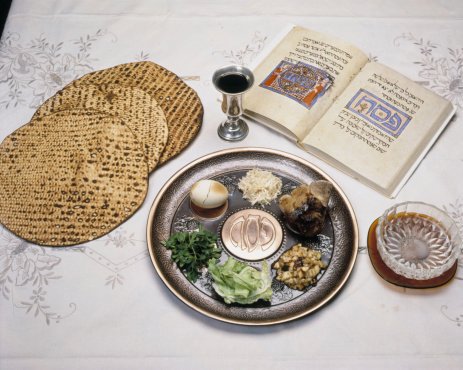Passover 2021 began in the evening of Saturday, March 27 and ends in the evening of Sunday, April 4
Sources: Wikipedia, Today.Com, MIT.com
What do you really know about Passover? Do you know why it is called Passover? Do you know why sections are set aside in supermarkets with matzah, and goods marked Kosher for Passover? What is a Seder?
Celebrating Passover
The first and last day (or two days in some countries outside Israel), are particularly important. People recite special blessings or prayers, make a particular effort to visit a synagogue or listen to readings from the Torah and eat a ceremonial meal. Passover is also called Pesach or Pesakh. The Pesach Seder, that occurs the night of the paschal full moon after the 14th of Nisan, eve of the 15th, centers around the telling the story of the exodus of the Jewish people, and remembering how the angel of death “passed over” the houses of the Israelites during the tenth plague on Egypt.
In many Reform Jewish communities, Passover is celebrated for seven days, not eight. In more traditional Jewish communities—including both Orthodox and Conservative communities—Passover is celebrated for eight days. In Israel, Jews only have one Seder, American Jews do it for two nights. In Jewish tradition, it is believed that the first two days of Passover speak of the past redemption from Egypt, but the last two days of Passover speak of the complete and ultimate redemption through the coming of Messiah.
A meal (seudah) for the Messiah on the eighth day was instituted by Rabbi Israel ben Eliezer (1698–1760), also called Baal Shem Tov. He is considered the founder of Chassidic Judaism, a branch of Orthodox Judaism.
Family and friends gather together after nightfall on the first and second nights of the holiday for the high point of the festival observance, the Seder. During the Seder, which means “order” in Hebrew, the experience of the Exodus is told in story, song, prayer, and the tasting of symbolic foods. The Seder meals; include four cups of wine, eating matzah and bitter herbs, and retelling the story of the Exodus.
Meaning of Passover
In Hebrew, Pesach means “to pass over”, because the Angel of Death passed over the Jewish homes to spare them from death that first Passover eve. The Israelites had been slaves to Egyptian pharaohs for many decades. Moses tried to appeal to the Egyptians with a message from God, but this were ignored. Then the LORD said to Moses, “Go to Pharaoh and say to him, this is what the LORD says: Let my people go, so that they may worship me. If you refuse to let them go, I will plague your whole country with frogs.” Devastating plagues then destroyed crops and livestock.
On the 15th day, the last of the ten plagues afflicted the Egyptians, killing all their firstborn. However, the Angel of Death spared the children of Israel, “passing over” their homes. The Pharaoh relented. Six hundred thousand adult males, plus many more women and children, left Egypt on that day and began the trek to Mount Sinai.
Perhaps the most well-known of Passover foods is matzah (unleavened bread), which is a reminder of the haste with which the slaves left Egypt because they did not even have time for the bread to rise. This “bread of affliction” was also eaten while the Jews were slaves. So in a way, it represents both suffering and redemption. For the duration of Passover, no leavened or fermented food or drink is eaten, including cake, cookies, cereal, pasta, and most alcoholic beverages. Traditionally, the matzah is served with a sweet condiment called charset, a mixture of apples, nuts, and wine. This symbolic dish represents the bricks used by the Jewish slaves to build Pharaoh’s cities.
If you do observe Passover, we hope you have a safe and enjoyable celebration!



